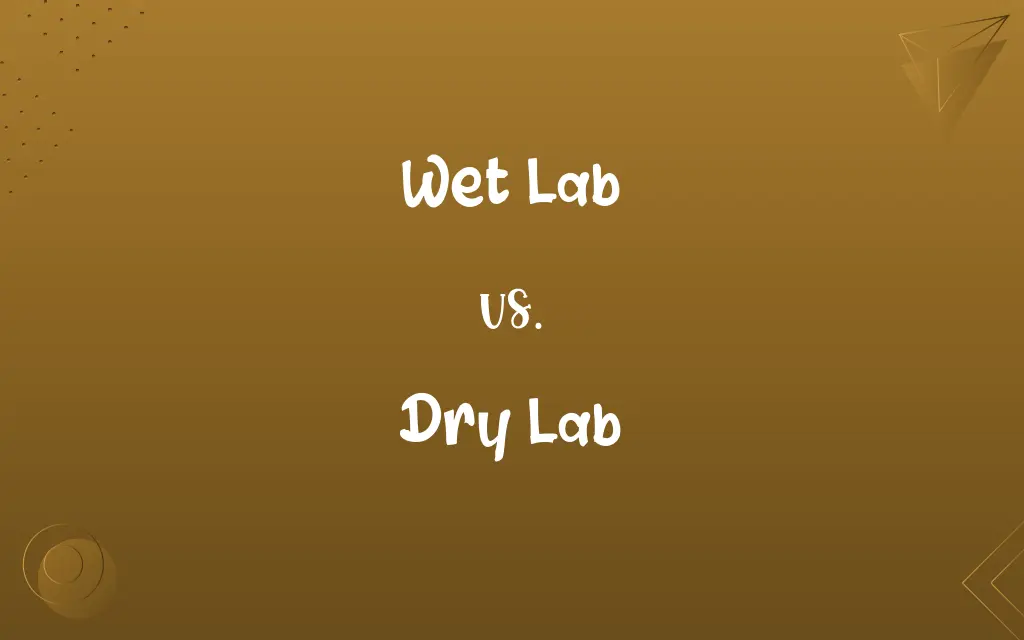Wet Lab vs. Dry Lab: Know the Difference

By Shumaila Saeed || Updated on December 25, 2023
Wet Labs involve hands-on experiments with chemicals, biological matter, and liquids, whereas Dry Labs involve computational or theoretical work without direct use of hazardous materials or live samples.

Key Differences
A Wet Lab is a laboratory where scientists conduct experiments involving chemicals, drugs, biological matter, and other liquid solutions. This environment is equipped with various apparatus like beakers, test tubes, and microscopes, and it requires strict safety protocols due to the hazardous nature of the materials involved.
Shumaila Saeed
Dec 10, 2023
In contrast, a Dry Lab refers to a laboratory where computational or theoretical research is conducted. This type of lab focuses on computer-generated models, simulations, and analysis of data. Dry Labs are often used in fields like computer science, mathematics, and theoretical physics, where physical experimentation is not necessary.
Shumaila Saeed
Dec 10, 2023
Wet Labs are essential for research in fields like chemistry, biology, and medicine. They provide a hands-on approach for testing scientific hypotheses, conducting experiments, and observing reactions in real-time.
Shumaila Saeed
Dec 10, 2023
Conversely, Dry Labs offer a safer, more controlled environment for analyzing large datasets, creating simulations, and modeling complex systems. They are crucial in fields that require extensive data analysis or where physical experiments are not feasible.
Shumaila Saeed
Dec 10, 2023
The nature of Wet Labs necessitates stringent safety measures, including the use of protective gear and adherence to specific protocols to handle potentially dangerous substances.
Shumaila Saeed
Dec 10, 2023
ADVERTISEMENT
Dry Labs, on the other hand, primarily require robust computational resources and software tools, emphasizing data security and computational efficiency over physical safety measures.
Shumaila Saeed
Dec 10, 2023
Comparison Chart
Primary Activities
Hands-on experiments with liquids and chemicals
Computational and theoretical research
Shumaila Saeed
Dec 10, 2023
Safety Concerns
Chemical hazards, biological risks
Data security, computational errors
Shumaila Saeed
Dec 10, 2023
Equipment Used
Beakers, microscopes, pipettes
Computers, software, data servers
Shumaila Saeed
Dec 10, 2023
Research Focus
Biology, chemistry, medicine
Data analysis, simulations, mathematics
Shumaila Saeed
Dec 10, 2023
ADVERTISEMENT
Environment
Requires physical space for experiments
Often virtual or reliant on computing resources
Shumaila Saeed
Dec 10, 2023
Wet Lab and Dry Lab Definitions
Wet Lab
A laboratory where experiments involve active manipulation of liquids and chemicals.
Researchers in the wet lab tested the vaccine on cell cultures.
Shumaila Saeed
Dec 02, 2023
Dry Lab
A research facility primarily using computer software for data interpretation.
The dry lab processed vast datasets to identify genetic markers.
Shumaila Saeed
Dec 02, 2023
Wet Lab
A facility equipped for experimentation in fields like biochemistry and molecular biology.
The new wet lab enabled groundbreaking research in genetic engineering.
Shumaila Saeed
Dec 02, 2023
Dry Lab
A laboratory focused on computational and theoretical research.
The dry lab developed a new algorithm for DNA sequencing.
Shumaila Saeed
Dec 02, 2023
ADVERTISEMENT
Wet Lab
A setting for biological or chemical research requiring direct, hands-on experimentation.
The wet lab was bustling with scientists analyzing blood samples.
Shumaila Saeed
Dec 02, 2023
Dry Lab
A setting where experiments are conducted virtually or through simulations.
The dry lab's virtual model helped understand the molecular structure.
Shumaila Saeed
Dec 02, 2023
Wet Lab
A lab where physical experiments with live samples are conducted.
In the wet lab, the team successfully isolated the virus.
Shumaila Saeed
Dec 02, 2023
Dry Lab
A workspace for data analysis and computer modeling in scientific research.
In the dry lab, they simulated the spread of the epidemic.
Shumaila Saeed
Dec 02, 2023
Wet Lab
A research space designed for testing and manipulating biological materials.
The wet lab’s advanced equipment was crucial for the drug discovery process.
Shumaila Saeed
Dec 02, 2023
Dry Lab
A lab where theoretical analysis replaces physical experiments.
Theoretical predictions made in the dry lab were later tested in the wet lab.
Shumaila Saeed
Dec 02, 2023
Dry Lab
To conduct an experiment in a fraudulent way that produces a desirable result, for example by inventing data.
What probably happened is that some damn intelligent bureaucrat dry-labbed it.
Shumaila Saeed
Dec 01, 2023
Repeatedly Asked Queries
What is a wet lab?
A wet lab is a lab where experiments involve physical manipulation of liquids, chemicals, and biological materials.
Shumaila Saeed
Dec 10, 2023
What is a dry lab?
A dry lab is a lab where research is computational or theoretical, focusing on data analysis and simulations.
Shumaila Saeed
Dec 10, 2023
Are simulations in a dry lab always accurate?
Not always; simulations are based on available data and theoretical models, which may have limitations.
Shumaila Saeed
Dec 10, 2023
Do dry labs require special equipment?
Dry labs primarily require computers and specialized software.
Shumaila Saeed
Dec 10, 2023
Can dry lab research replace wet lab experiments?
In some cases, particularly in initial stages of research or where physical experiments are not feasible.
Shumaila Saeed
Dec 10, 2023
What safety equipment is essential in a wet lab?
Protective clothing, goggles, gloves, and proper ventilation are essential.
Shumaila Saeed
Dec 10, 2023
Are dry labs less expensive to maintain than wet labs?
Generally, yes, as they require less physical equipment and hazardous material management.
Shumaila Saeed
Dec 10, 2023
Can dry labs help in biological research?
Yes, dry labs are instrumental in biological research for data analysis and modeling biological processes.
Shumaila Saeed
Dec 10, 2023
Are wet labs only for chemistry experiments?
No, wet labs are used for a variety of experiments in biology, medicine, and related fields as well.
Shumaila Saeed
Dec 10, 2023
Is programming knowledge necessary for working in a dry lab?
It's often beneficial, as much of the work involves computational analysis.
Shumaila Saeed
Dec 10, 2023
Is a wet lab more dangerous than a dry lab?
Generally, yes, due to the handling of hazardous materials in wet labs.
Shumaila Saeed
Dec 10, 2023
Do wet labs require more space than dry labs?
Typically, yes, due to the need for physical equipment and safety measures.
Shumaila Saeed
Dec 10, 2023
Can wet lab results be analyzed in a dry lab?
Yes, wet lab results are often analyzed and further explored in dry labs.
Shumaila Saeed
Dec 10, 2023
What kind of training is required for wet lab work?
Training in handling chemicals, biological samples, and laboratory equipment is essential.
Shumaila Saeed
Dec 10, 2023
Can dry labs contribute to pharmaceutical research?
Yes, particularly in drug design and data analysis phases.
Shumaila Saeed
Dec 10, 2023
Can wet lab techniques be used in a dry lab?
No, wet lab techniques involve physical experimentation, which is not applicable in a dry lab setting.
Shumaila Saeed
Dec 10, 2023
Do dry labs use virtual reality technology?
In some cases, particularly for complex simulations and models.
Shumaila Saeed
Dec 10, 2023
Is data security a major concern in dry labs?
Yes, given the sensitive and extensive nature of data handled in dry labs.
Shumaila Saeed
Dec 10, 2023
Are wet labs used for educational purposes?
Yes, they are commonly used in educational settings for hands-on learning.
Shumaila Saeed
Dec 10, 2023
Can a single lab be both a wet and dry lab?
Yes, some labs combine both elements for comprehensive research capabilities.
Shumaila Saeed
Dec 10, 2023
Share this page
Link for your blog / website
HTML
Link to share via messenger
About Author
Written by
Shumaila SaeedShumaila Saeed, an expert content creator with 6 years of experience, specializes in distilling complex topics into easily digestible comparisons, shining a light on the nuances that both inform and educate readers with clarity and accuracy.








































































